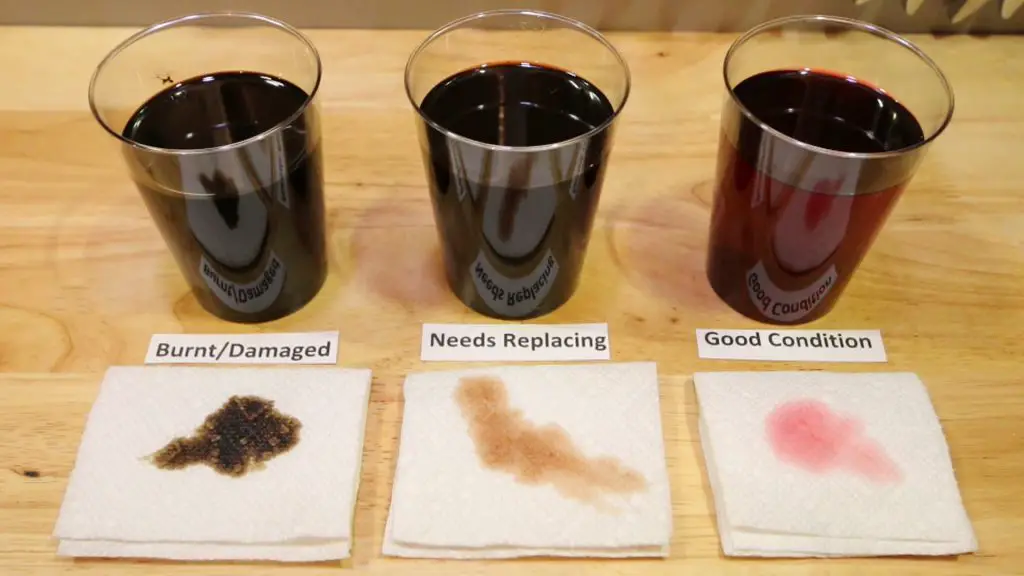1. The transmission is slipping or jerking when shifting gears: If your car is having trouble transitioning between gears, it could indicate a need for new fluid.
2. Unusual noises coming from the engine: If you hear grinding, whining, or humming sounds coming from your engine while driving, it may be time to change the fluid in your transmission.
3. The fluid smells burnt: Burnt smell indicates that the oil has degraded and needs to be replaced with fresh oil as soon as possible.
4. Leaking fluids: Transmission fluid should not leak out of the system at any point; if you find any puddles underneath your vehicle then it’s likely there’s an issue with the seal which will require replacing along with new fluid being added back into the system afterwards.
5. Dark colored or bad smelling fluids: As time passes, transmission fluid can become dark and have a foul odor due to contamination; this means that you’ll need to drain out old fluid and replace it with clean lubricant in order to keep things running smoothly again!
If you’re noticing difficulty shifting gears, loud grinding noises coming from the transmission, or a delay when accelerating, it could be time to change your vehicle’s transmission fluid. These are all signs that the fluid is too old and needs to be replaced in order to maintain optimal performance of your car’s transmission system. Make sure you take care of this as soon as possible so you can avoid more serious (and expensive) problems down the line!
Should I Change My Transmission Fluid?
Does Changing Transmission Fluid Help Shifting
Changing transmission fluid can help improve shifting by removing deposits and contaminants from the system, reducing friction between components and restoring overall lubrication. This helps ensure smoother and more consistent shifts while also helping to prevent premature wear on transmission parts. Additionally, regular changes of the fluid can help extend the life of your transmission and keep it running reliably for longer periods of time.
How Long Does It Take to Change Transmission Fluid
Changing transmission fluid is a regular maintenance task that should be completed every 30,000 to 60,000 miles, depending on what type of car you have. The actual process of changing the fluid typically takes between two and four hours to complete. Most automotive technicians recommend allowing yourself an entire afternoon for the job so that it can be done correctly without any rushed steps or potential mistakes.
How Often to Change Automatic Transmission Fluid
It is generally recommended to change the automatic transmission fluid in your car every 30,000 to 60,000 miles. This will help ensure that the fluid remains clean and free of contaminants which can cause damage to your transmission system. If you drive frequently or tow heavy loads with your vehicle then it may be necessary to change the fluid more often than this recommendation suggests.
It’s important to refer to your owner’s manual for specific instructions regarding when and how often you should service your vehicle’s automatic transmission fluid.
Should I Change Transmission Fluid After 100K Miles
When it comes to changing the transmission fluid, many vehicle owners ask whether they should change it after 100K miles. It is recommended that you change your transmission fluid every 30-50K miles in order to keep your car running smoothly and prevent damage from occurring over time. However, if you have driven more than 100K miles without changing the transmission fluid, then it would be a good idea to get it checked out by a mechanic and possibly have the fluid changed as well.

Credit: gearstar.com
How Do I Know If My Transmission Fluid Needs to Be Changed?
To determine if your transmission fluid needs to be changed, you should first check the manufacturer’s recommended service intervals for your specific make and model. You will also want to look at the color of the fluid; if it is dark brown or has a burnt smell, then it is likely time for a change. Additionally, you may want to consider having an expert mechanic inspect the vehicle and perform any necessary maintenance or repairs that are needed.
Paying attention to how smoothly your vehicle shifts gears can also provide clues about potential transmission problems, as well as any strange noises coming from underneath the hood.
What are the Symptoms of Dirty Transmission Fluid?
Dirty transmission fluid can cause a variety of symptoms that range from decreased vehicle performance to increased wear and tear on the internal parts of your car’s transmission. Common signs of dirty transmission fluid include jerky shifts, delayed engagement when shifting gears, slipping or stuck gears, unusual noises coming from the engine bay, higher than normal operating temperatures and even leaking fluids. These issues can be caused by a number of factors such as low levels of lubrication from dirty fluid or contamination in the system due to particles and other debris.
If you notice any abnormal behavior with your vehicle it is important to have it inspected immediately as this could be an indication that there is something wrong with your car’s transmission system.
What Happens If You Don’T Change Your Transmission Fluid?
If you don’t change your transmission fluid, it can cause major damage to the transmission. The old and dirty transmission fluid will not be able to lubricate or cool the internal parts of the transmission correctly, which could lead to metal-on-metal contact and eventually, catastrophic failure. Additionally, as time passes, contaminants such as dirt and other particles will build up in the system leading to a decrease in performance and eventual breakdowns.
All these problems can lead to expensive repairs or even replacement of your entire transmission system – something that would have been avoided with regular maintenance like changing your transmission fluid.
How Often Should Transmission Fluid Be Changed?
Transmission fluid should generally be changed every 30,000 to 60,000 miles depending on the type of vehicle and the age of the transmission. It is important to check your owner’s manual for recommended change intervals as they can vary greatly by make and model. If you have an older or high-mileage vehicle it may be necessary to change the fluid more often than usual in order to avoid potential problems with shifting or stalling.
Additionally, if you do a lot of stop-and-go driving or frequently tow heavy loads, then changing your transmission fluid at shorter intervals may help extend its life expectancy.
Conclusion
Changing your transmission fluid is an essential part of keeping your vehicle in good working order. It helps to lubricate the moving parts and can help extend the life of the transmission. If you are experiencing any of the signs mentioned above, it might be time to have a look at your vehicle’s transmission fluid levels.
It’s important that you take care of this maintenance as soon as possible to ensure that your car remains reliable and efficient for years to come. Remember, regular maintenance like changing out fluids is a must when it comes to extending the lifespan of any machine—especially vehicles!



